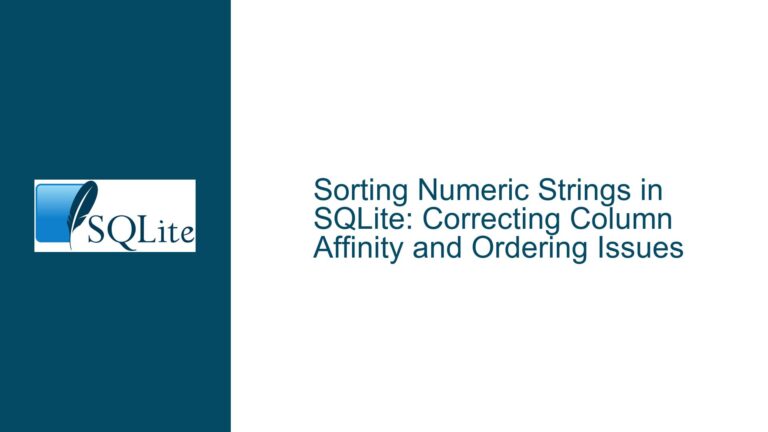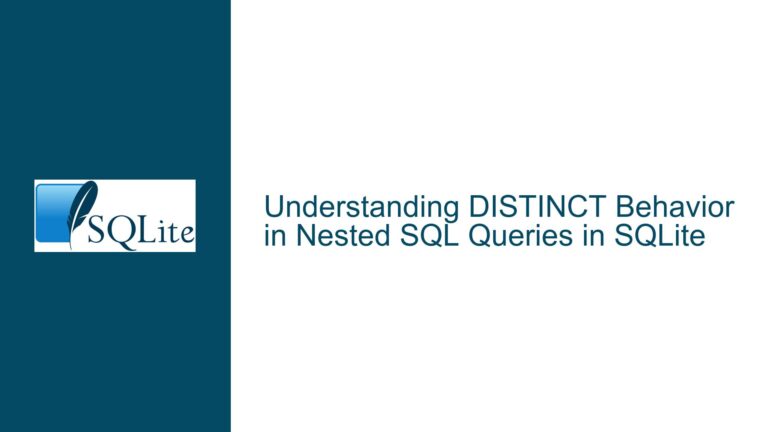JSON Path Parsing Issue with Zero-Length Keys in SQLite
Understanding the JSON Path Parsing Issue with Zero-Length Keys
The issue at hand revolves around the behavior of SQLite’s json_extract function when dealing with JSON objects that contain zero-length keys. While SQLite’s json_valid function correctly identifies a JSON object with a zero-length key as valid, the json_extract function fails to parse the JSON path when attempting to retrieve the value associated with a zero-length key. This discrepancy raises questions about the internal handling of JSON paths in SQLite, particularly in edge cases involving zero-length keys.
To illustrate the problem, consider the following SQL statements:
SELECT json_valid('{"":"foo"}'); -- Returns 1, indicating valid JSON
SELECT json_extract('{"":"foo"}', '$.""'); -- Throws an error: "JSON path error near '""'"
The first statement confirms that the JSON object {"":"foo"} is valid according to SQLite’s JSON validation rules. However, the second statement, which attempts to extract the value associated with the zero-length key using json_extract, results in an error. This inconsistency suggests a limitation or oversight in the JSON path parsing logic within SQLite.
Exploring the Causes of the JSON Path Parsing Error
The root cause of this issue lies in the way SQLite’s JSON path parser handles zero-length keys. JSON paths in SQLite are designed to navigate through JSON objects and arrays by specifying keys or indices. However, the parser appears to have a specific limitation when encountering a zero-length key in the path expression.
When the json_extract function attempts to parse the path '$.""', it encounters a zero-length key between the double quotes. The parser, as currently implemented, does not account for this edge case, leading to a parsing error. This behavior is consistent with the observation that zero-length keys are not commonly used in JSON objects, and thus, the parser may not have been designed to handle them gracefully.
Furthermore, the issue is compounded by the fact that SQLite allows zero-length identifiers in other contexts, such as table and column names. For example, the following SQL statements are valid in SQLite:
CREATE TABLE "" ("" INTEGER PRIMARY KEY);
SELECT length(name) FROM sqlite_master; -- Returns 0 for the zero-length table name
This discrepancy between the handling of zero-length identifiers in SQL schema and JSON paths highlights an inconsistency in SQLite’s parsing logic. While SQLite’s SQL parser can handle zero-length identifiers, the JSON path parser cannot, leading to the observed error.
Resolving the JSON Path Parsing Issue with Zero-Length Keys
To address this issue, there are several potential solutions and workarounds that can be employed, depending on the specific use case and constraints.
1. Avoid Zero-Length Keys in JSON Objects
The simplest solution is to avoid using zero-length keys in JSON objects altogether. This approach aligns with best practices for JSON schema design, where keys are typically expected to have meaningful names. By ensuring that all keys in a JSON object have a non-zero length, the issue with json_extract can be entirely avoided.
2. Use json_each to Iterate Over JSON Objects
For cases where zero-length keys are unavoidable, an alternative approach is to use the json_each function to iterate over the key-value pairs in the JSON object. This function returns a table with columns for the keys and values, allowing for programmatic access to the data without relying on JSON path expressions.
For example, the following SQL statement can be used to retrieve the value associated with a zero-length key:
SELECT json_each.value
FROM json_each('{"":"foo"}')
WHERE json_each.key = '';
This approach effectively bypasses the limitation of json_extract by directly querying the JSON object’s key-value pairs. However, it requires additional processing to filter and extract the desired values, which may not be as efficient as using json_extract for simple path expressions.
3. Patch SQLite to Support Zero-Length Keys in JSON Paths
For users who require direct support for zero-length keys in JSON paths, the most robust solution is to apply a patch to SQLite that modifies the JSON path parser to handle zero-length keys correctly. As mentioned in the discussion, a patch has already been developed to address this issue, and it is expected to be included in a future release of SQLite.
Until the patch is widely available, users can apply the patch to their local copy of SQLite or use a custom build that includes the fix. This approach ensures that json_extract can handle zero-length keys without errors, providing a seamless experience for working with JSON data.
4. Use a Custom JSON Parsing Function
In scenarios where modifying SQLite is not feasible, another option is to implement a custom JSON parsing function that can handle zero-length keys. This function can be written in a procedural language such as Python or JavaScript and integrated with SQLite using its extension mechanism.
For example, a Python function could be written to parse the JSON object and extract the value associated with a zero-length key:
import json
def json_extract_zero_length_key(json_str):
data = json.loads(json_str)
return data.get('', None)
This function can then be registered as a SQLite user-defined function, allowing it to be called from SQL statements:
SELECT json_extract_zero_length_key('{"":"foo"}'); -- Returns 'foo'
While this approach provides flexibility and control over JSON parsing, it introduces additional complexity and may not be as performant as native SQLite functions.
Conclusion
The issue of parsing zero-length keys in JSON paths with SQLite’s json_extract function highlights the importance of considering edge cases in software design. While the current implementation of json_extract does not support zero-length keys, several workarounds and solutions are available to address this limitation.
By avoiding zero-length keys, using json_each for iteration, applying a patch to SQLite, or implementing a custom JSON parsing function, users can effectively work around the issue and continue to leverage SQLite’s powerful JSON capabilities. As SQLite continues to evolve, it is likely that future releases will include built-in support for zero-length keys, further enhancing its utility for working with JSON data.






